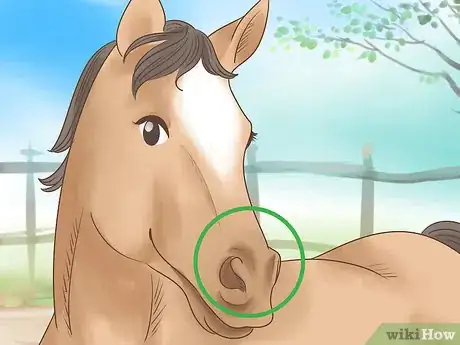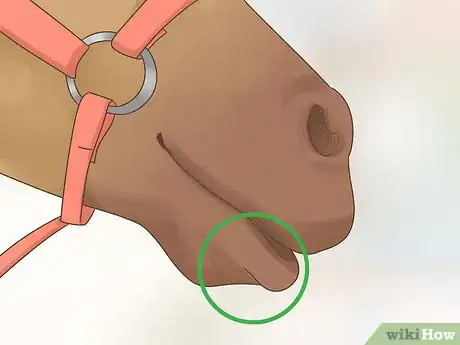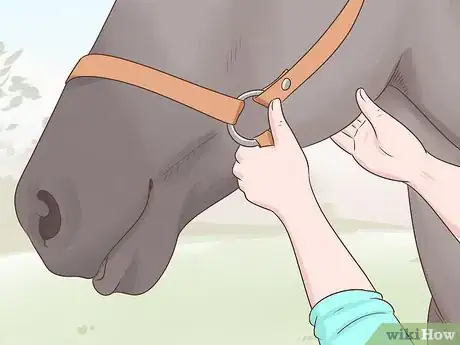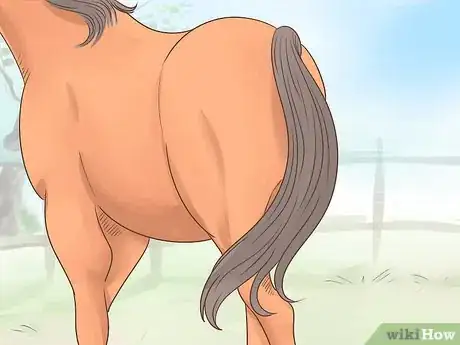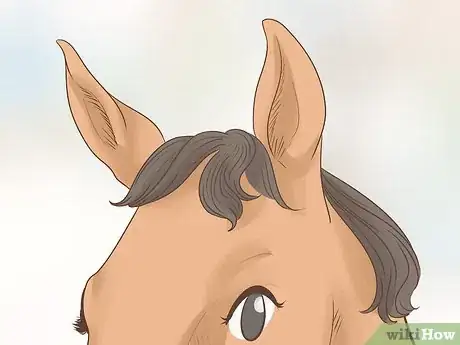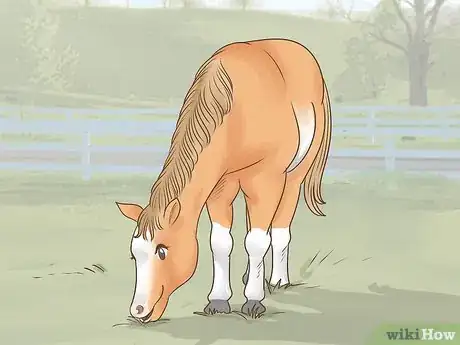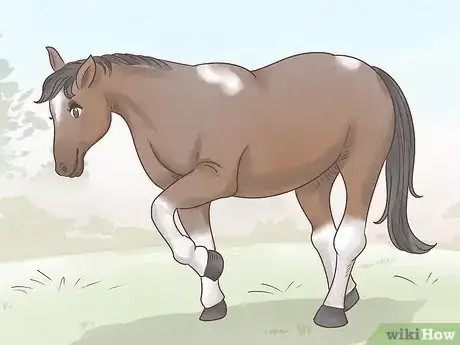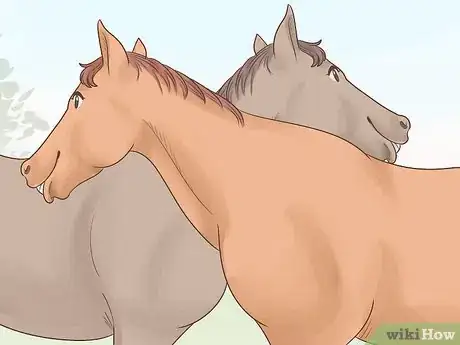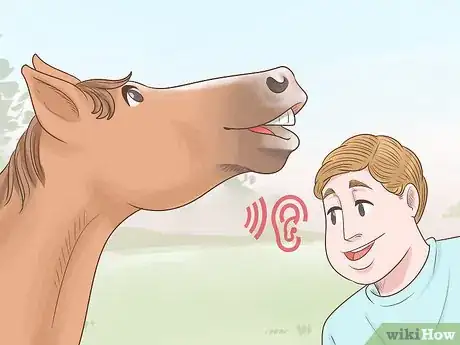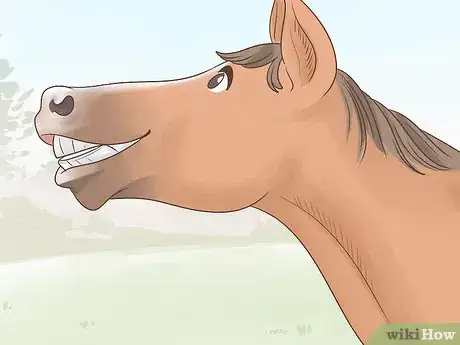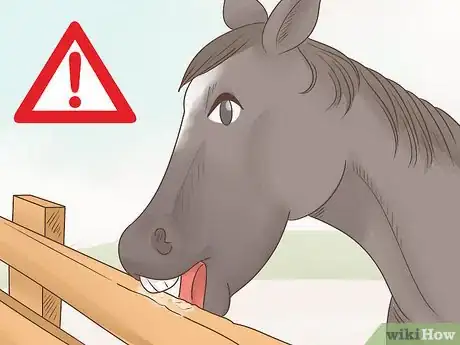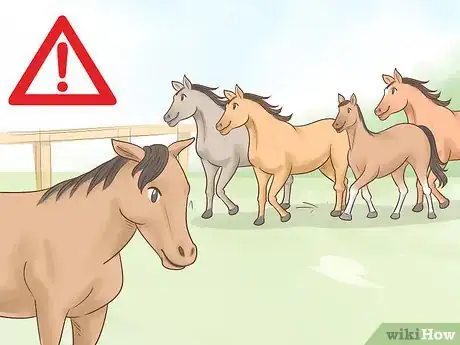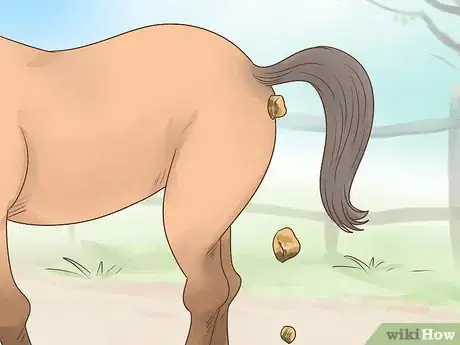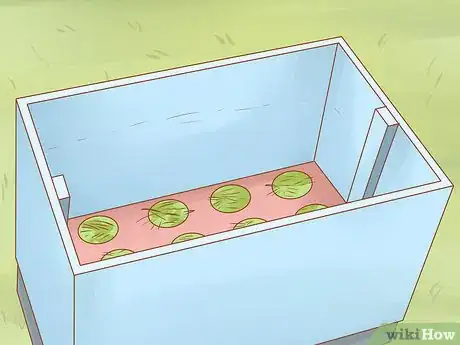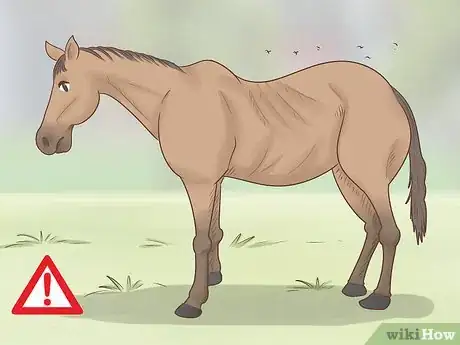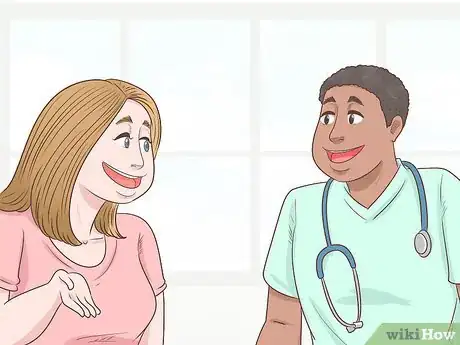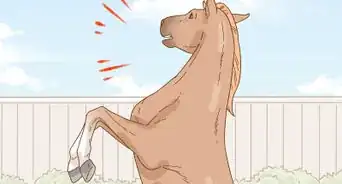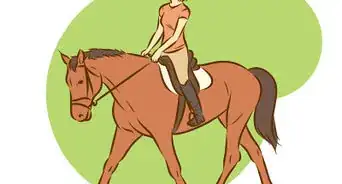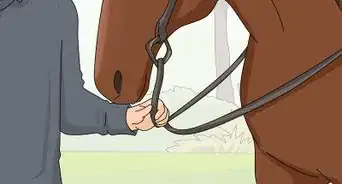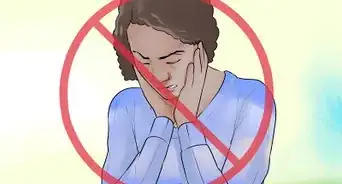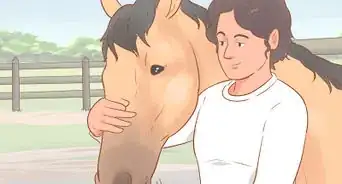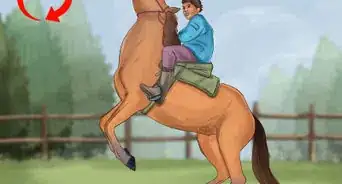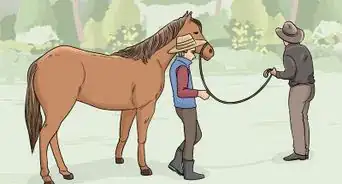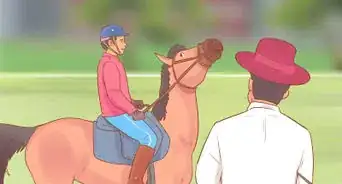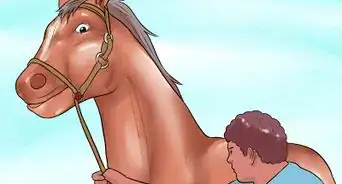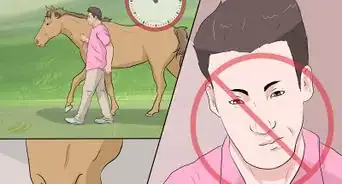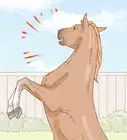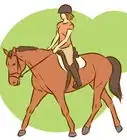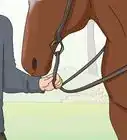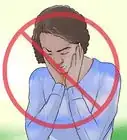This article was co-authored by Ryan Corrigan, LVT, VTS-EVN. Ryan Corrigan is a Licensed Veterinary Technician in California. She received her Bachelor of Science in Veterinary Technology from Purdue University in 2010. She is also a Member of the Academy of Equine Veterinary Nursing Technicians since 2011.
wikiHow marks an article as reader-approved once it receives enough positive feedback. In this case, several readers have written to tell us that this article was helpful to them, earning it our reader-approved status.
This article has been viewed 65,487 times.
One of the most important parts of keeping a horse healthy is making sure it is happy and fulfilled. Without happiness, a horse will suffer not only emotionally but physically. However, for most people, it is somewhat difficult to determine if a horse is happy. Fortunately, by watching to see if the horse looks relaxed, observing its behavior, and considering its overall health, you'll have a better chance of telling if a horse is happy.
Steps
Watching Their Physical Appearance
-
1Look to see if their nostrils are relaxed. A happy horse's nostrils will look relaxed. They'll also appear soft and round. Horses that are unhappy may have tense nostrils that appear thin and rigid.[1]
-
2Observe the lips. The horse's lower lip should curl down slightly and appear relaxed. This is an overall indication that the horse is relaxed and in a good mood. If the lip looks tense and tight, the horse may be stressed or unhappy.[2]Advertisement
-
3Watch to see if the horse's jaw is relaxed. When your horse is happy, their jaw should be relatively loose and relaxed. This signifies the fact that they are not stressed out. If you feel your horse's jaw muscles, they should be smooth and soft; the muscles will be tight and tense if the horse is nervous or afraid. In addition, you may see the horse drooling a little bit.[3]
-
4Look to see if their tail is relaxed. A happy horse should have a relaxed tail that is not tense. Their tail should swing back-and-forth in an even manner. If the tail is not moving or appears tense, the horse may not be happy.[4]
- If the tail is moving back-and-forth very quickly, it may suggest that your horse is stressed out.
- Watch to see if there are a lot of flies or other insects present, if this is the case, your horse's tail movement may simply be an effort to swat them away.
-
5Watch your horse's ears. Happy horses will have their ears forward and alert, engaged in their surroundings and moving towards where they are listening. Unhappy horses may have their ears pinned back or softly drooping.
Watching Their Behavior
-
1Observe whether the horse is grazing. Horses are often happy when they graze. If you notice your horse walking around the pasture and slowly grazing, this is a good indication that they are happy. Unhappy horses may stand still or gallop along fence lines.[5]
-
2Watch to see if they are rearing or pawing. If you see your horse rearing their front legs upward or pawing/scratching at the ground, they may be happy. Ultimately, these are signs that the horse is in a playful mood. Unhappy horses won't play.[6]
-
3Note if horses are grooming each other. Observe how your horses interact together. If two or more horses are engaged in grooming behavior, they're likely relaxed and happy. Ultimately, grooming is a behavior horses will do when they are at ease and want to bond with others.[7]
-
4Listen for snorting sounds. When a horse breathes out rapidly through its nostrils and makes a light snort sound, they're likely happy. This is often a sign that a horse is relaxed and satisfied. The horse may make this sound while they're being ridden or interacting with a person or another horse.[8]
-
5Pay attention to nickering. If your horse does a light nicker while being alert, having a raised head, and pointing their ears in your direction, they may be happy. Your horse may nicker when you're bringing food or treats to them. They may also nicker if they're excited to see you or another horse.
- If nickering becomes more intent, high pitch, or seems stressed, it could be a sign your horse is unhappy.[9]
-
6Watch to see if the horse is crib-biting. Cribbing is when a horse bites something with its teeth, arches its neck, and then makes a sort of grunt. Cribbing is a sign that a horse is stressed out and unhappy. If your horse chews, gnaws, or cribs, it is likely stressed. You should consult a veterinarian if your horse exhibits this behavior often.[10]
- Horses will usually bite onto stall doors, poles, or other hard objects when cribbing.
-
7Watch your horse's herd behavior. Horses are herd animals and like to be near other horses – usually within 5 to 10 feet (1.5 to 3.0 m). Horses that are unhappy will be off by themselves, intentionally isolating themselves from the herd.
Considering Overall Health
-
1Look to see if they go to the bathroom normally. If your horse is walking around the pasture and defecating or urinating, they're likely relaxed and may be happy. This is important, as stressed horses will often not go to the bathroom.[11]
-
2Observe to see if the horse is eating enough. With horses, as with humans, appetite is closely related to happiness and general health. A poor appetite may be a good indication that a horse is sick or unhappy. As a result, monitor your horse's eating habits. Take note of their feed box, their grazing routine, and any other source of food they consume.[12]
-
3Watch for signs of sickness. Illness is probably the biggest factor that could cause a horse to be unhappy. As a result, be diligent about watching your horse for signs of sickness. Common ailments include:
- Skin conditions like ringworm, mud fever (associated with wet and muddy conditions), and cracked heels (similar to mud fever).
- Respiratory problems like a cold or a cough. To identify a cold or cough, listen for coughing sounds and watch for nasal discharge.
- Weight loss, which is often associated with stress. Unhappy horses can show some weight and muscle loss over time.
- Colic, which could be a result of many things, but almost always manifests in abdominal pain.[13]
-
4Consult your vet. If you are concerned about whether your horse is happy, you should talk to your veterinarian. As a professional who deals with a lot of horses, your veterinarian will likely have a good idea as to whether your horse is satisfied or not.
- Schedule regular appointments with your veterinarian. Your horse should see a vet at least once a year.
- Contact your vet if your horse has any sudden health changes.
- Talk to your vet if your horse seems lethargic, depressed, or otherwise unhappy.
Warnings
- Always speak, whistle, and make noise to let the horse know you are approaching. Even happy horses may kick if startled.⧼thumbs_response⧽
- If an unhappy horse behaves aggressively, get a professional to help you at once.⧼thumbs_response⧽
- Colic is an emergency. Contact a vet immediately if your horse is unhappy because of pain.⧼thumbs_response⧽
- Never enter a horse's stall and close the door behind you! Always leave yourself an escape path.⧼thumbs_response⧽
References
- ↑ http://www.yourhorse.co.uk/advice/horse-behaviour/articles/13-signs-your-horse-is-happy
- ↑ http://www.yourhorse.co.uk/advice/horse-behaviour/articles/13-signs-your-horse-is-happy
- ↑ http://www.yourhorse.co.uk/advice/horse-behaviour/articles/13-signs-your-horse-is-happy
- ↑ https://equusmagazine.com/behavior/how-to-read-your-horses-body-language-8577
- ↑ http://www.yourhorse.co.uk/advice/horse-behaviour/articles/13-signs-your-horse-is-happy
- ↑ http://www.yourhorse.co.uk/advice/horse-behaviour/articles/13-signs-your-horse-is-happy
- ↑ http://www.yourhorse.co.uk/advice/horse-behaviour/articles/13-signs-your-horse-is-happy
- ↑ https://practicalhorsemanmag.com/health-archive/understand-horse-communication-11362
- ↑ https://practicalhorsemanmag.com/health-archive/understand-horse-communication-11362
About This Article
To tell if a horse is happy, look at its tail to see if it’s relaxed and swishing back and forth evenly, which is a sign that it’s content. Additionally, observe the horse’s ears, which will be forward and alert when it’s happy, but pinned back or drooping if it’s stressed. You can also look for signs of happiness in the horse’s behaviors, such as slowly grazing, pawing at the ground, or making gentle snorting sounds. For more tips from our Veterinary co-author, like how to tell if your horse is happy by its appetite, read on!
